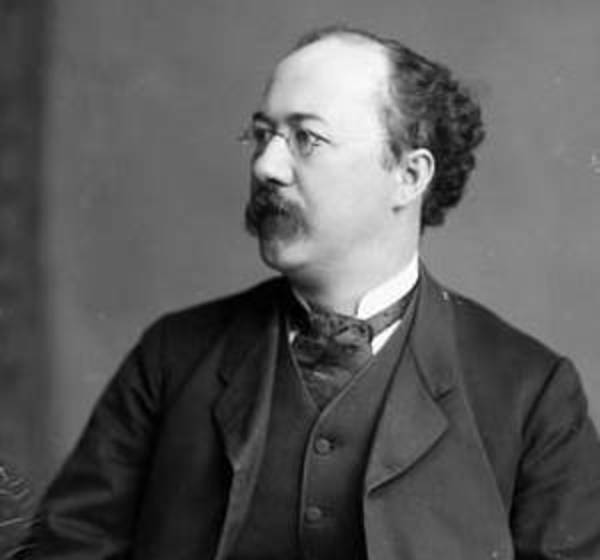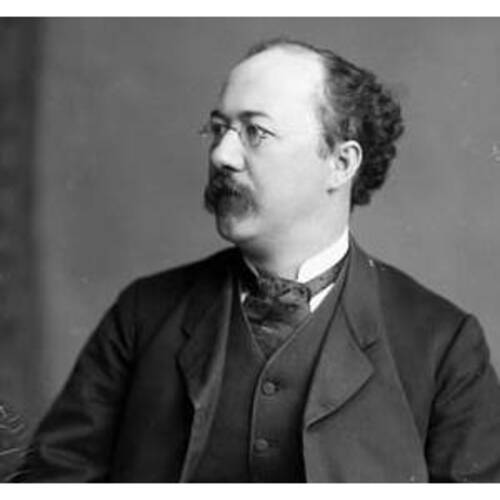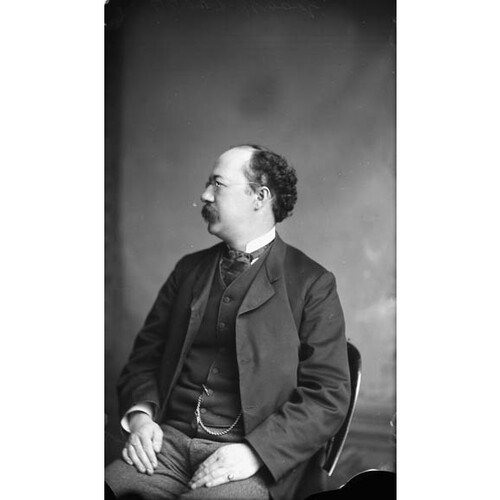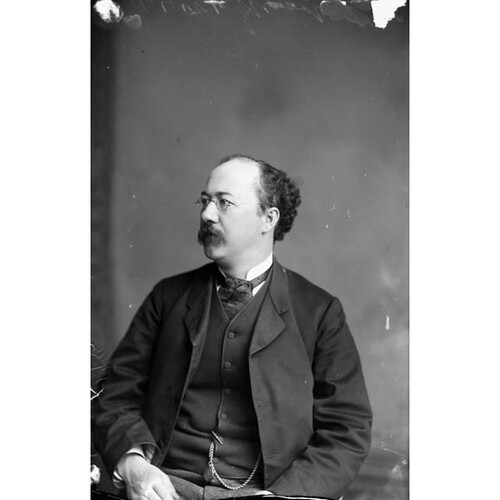
Source: Courtesy of Wikimedia Commons
WOOD, JOHN FISHER, teacher, lawyer, businessman, and politician; b. 12 October in either 1850 or 1852 in Addison, Upper Canada, son of John Wood and Mary Ann Wadden; d. unmarried 14 March 1899 in Toronto and was buried in Brockville.
John Fisher Wood was the son of a native of Banffshire, Scotland, who had immigrated to the Canadas early in life and become a railway contractor. Young John was educated in the Addison area and at the grammar school in Farmersville (Athens). After teaching school for some time, he studied law in the office of Christopher Finlay Fraser in Brockville, where he commenced practice following his call to the bar in 1876. Two years later he formed a partnership with William H. Ferguson. Appointed qc in 1890, Wood was solicitor for the United Counties of Leeds and Grenville and the Brockville Building and Savings Society. In addition to his practice, he was vice-president of the Brockville, Westport and Sault Ste Marie Railway, chartered in 1884. Wood maintained his practice in Brockville until his death, at which time his partner was Hugh Alexander Stewart.
Wood was elected to the House of Commons for Brockville in 1882, defeating drug manufacturer William Henry Comstock by five votes, and held the seat until he died. He acted as deputy speaker in 1890–91 and was chairman of the committee on railways and canals in 1892. When Sir John Sparrow David Thompson became prime minister that year, he replaced the minister of inland revenue (John Costigan*) and the minister of customs (Joseph-Adolphe Chapleau) with controllers, who were to be members of the ministry but not of the cabinet. They would be answerable to the minister of trade and commerce, a new post filled by Senator Mackenzie Bowell*. Wood was controller of inland revenue from 5 Dec. 1892 to 16 Dec. 1895, when, upon the resignation of Nathaniel Clarke Wallace*, he became controller of customs, which post he held, with a brief interruption, until the resignation of the government of Sir Charles Tupper* on 8 July 1896.
On the death of Thompson in 1894 Bowell had become prime minister. Wood was one of the seven members of the “nest of traitors” (the others were William Bullock Ives, George Eulas Foster*, John Graham Haggart*, Walter Humphries Montague, Sir Charles Hibbert Tupper*, and Arthur Rupert Dickey) who resigned from his government on 4 Jan. 1896, just after parliament had reopened for the purpose of enacting remedial legislation to restore the school rights of the Roman Catholic minority in Manitoba. At the time many thought the “bolters” wanted to drop the legislation, but, although several may have had such a motivation, the group as a whole did not. Its sole objective was to force the notoriously inept Bowell to make way for a more able leader. His eventual departure seems to have been the understanding arrived at when, with the exception of C. H. Tupper, they returned to the cabinet on 15 January. Bowell resigned as prime minister at the end of the parliamentary session, in April, and was succeeded by Tupper Sr.
Wood was not a frequent participant in parliamentary debates, his interventions usually being brief and often to clarify legal points. He complained about lengthy speeches on matters that he contended could be settled in much less time and he felt that the publication of Hansard encouraged this verbosity. On one occasion, in 1885, his motion that it be discontinued came within 40 votes of carrying. In 1892, he argued again for its discontinuance, at least in committee hearings, but was again unsuccessful. Twice, in 1885 and 1895, he gave able speeches in support of the National Policy, along with facts and figures showing its beneficial results. In 1886 he made a reasoned defence of the government’s course in allowing the execution of Louis Riel* to take place. Twelve years later, in a show of support for the electoral franchise bill, enacted by Sir John A. Macdonald in 1885 to establish federal voters’ lists, he opposed its repeal by the Liberal government of Sir Wilfrid Laurier*.
Wood died on 14 March 1899 during a visit to Toronto, evidently as a result of heart failure. When parliament opened on the 16th, Laurier moved, seconded by Sir Charles Tupper, that the house stand adjourned until the 20th out of respect for Wood and Pierre-Malcolm Guay, an mp who had died the previous month. Laurier expressed sentiments about Wood which were widely echoed in editorials: “He was very much respected by his opponents, and he was dearly beloved, I know, by his friends. His judicial mind, his temper, his character, were such that every one of us feels a sense of bereavement at his loss.” Other comment, as noted in the Toronto Globe, emphasized Wood’s unfailing courtesy, even during acrimonious debates, and his fairness to opponents. His funeral in Brockville was attended by numerous friends and some 40 mps from both sides of the house, including Sir Henri-Gustave Joly* de Lotbinière, Sir Charles Hibbert Tupper, and William Bullock Ives. A Presbyterian, Wood left an estate valued at $24,789.80 to two sisters, with the request that they “provide” for a third, Margaret, as he had done during his life.
AO, RG 22, ser.176, reg.8 (1895–1901), no.2921; ser.l79, no.2921. Can., House of Commons, Debates, 1885–99. Brockville Evening Recorder, 17 March 1899. Daily Mail and Empire, 15 March 1899. Globe, 18 March 1899. Canadian men and women of the time (Morgan; 1898). Cyclopædia of Canadian biog. (Rose and Charlesworth), 1: 252. Dominion annual reg., 1882: 403. T. W. H. Leavitt, History of Leeds and Grenville, Ontario, from 1749 to 1879 . . . (Brockville, Ont., 1879; repr. Belleville, Ont., 1972), 182.
Cite This Article
Lovell Clark, “WOOD, JOHN FISHER,” in Dictionary of Canadian Biography, vol. 12, University of Toronto/Université Laval, 2003–, accessed March 1, 2026, https://www.biographi.ca/en/bio/wood_john_fisher_12E.html.
The citation above shows the format for footnotes and endnotes according to the Chicago manual of style (16th edition). Information to be used in other citation formats:
| Permalink: | https://www.biographi.ca/en/bio/wood_john_fisher_12E.html |
| Author of Article: | Lovell Clark |
| Title of Article: | WOOD, JOHN FISHER |
| Publication Name: | Dictionary of Canadian Biography, vol. 12 |
| Publisher: | University of Toronto/Université Laval |
| Year of publication: | 1990 |
| Year of revision: | 1990 |
| Access Date: | March 1, 2026 |





